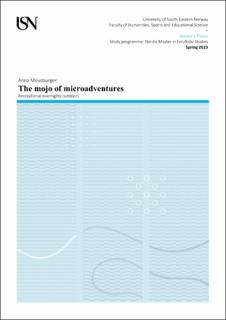The mojo of microadventures
Abstract
Overnight microadventure! Sounds exciting? Tiny? Fun? Wild? What are the mental images popping up in your mind? Microadventure is a new term for a phenomenon that has existed for a long time but has gained momentum again in the past few years because of changes in employment structures and restricted leisure practices during the Covid-19 pandemic. This paper defines a microadventure as a short overnight trip outdoors in the local natural surroundings for recreational purposes. This research explores the motives of people who do overnight trips and the features that define an overnight microadventure. An interpretive perspective provides the theoretical basis for this qualitative research project which uses an online survey and individual semi-structured interviews to collect data about overnight microadventures. With a thematic analysis of the data set, microadventures were identified as simple and relaxed overnight stays. The low threshold described by the participants indicates that it is easy to get to the core of the experience. Overnight microadventures offer a form of escape from routines, timetables and schedules, screens, the city, and big questions and facilitate a sense of presence and fascination. Presence and fascination are associated with relaxation and refreshment, the most crucial aim when doing a micro-adventurous overnight. Furthermore, overnight microadventures are related to potential benefits in relationships with other people and places. In the discussion, the findings were interpreted in relation to the existing literature on outdoor recreation and the socio-psychological pathways of well-being. Thereby, it aligns with existing literature on the benefits of outdoor recreation and adds a perspective on the contribution of microadventures. Exploring micro-adventurous overnights will promote a better understanding of what this practice means to participants and how they interpret their experiences. Expanding the knowledge about the defining features of overnight microadventures, the motives to sleep outdoors, and the benefits derived from these outings contributes to the ongoing discussion about the right to public access and the requirements and benefits of sleeping outdoors. This could have practical implications for policy papers on land use and health recommendations.
